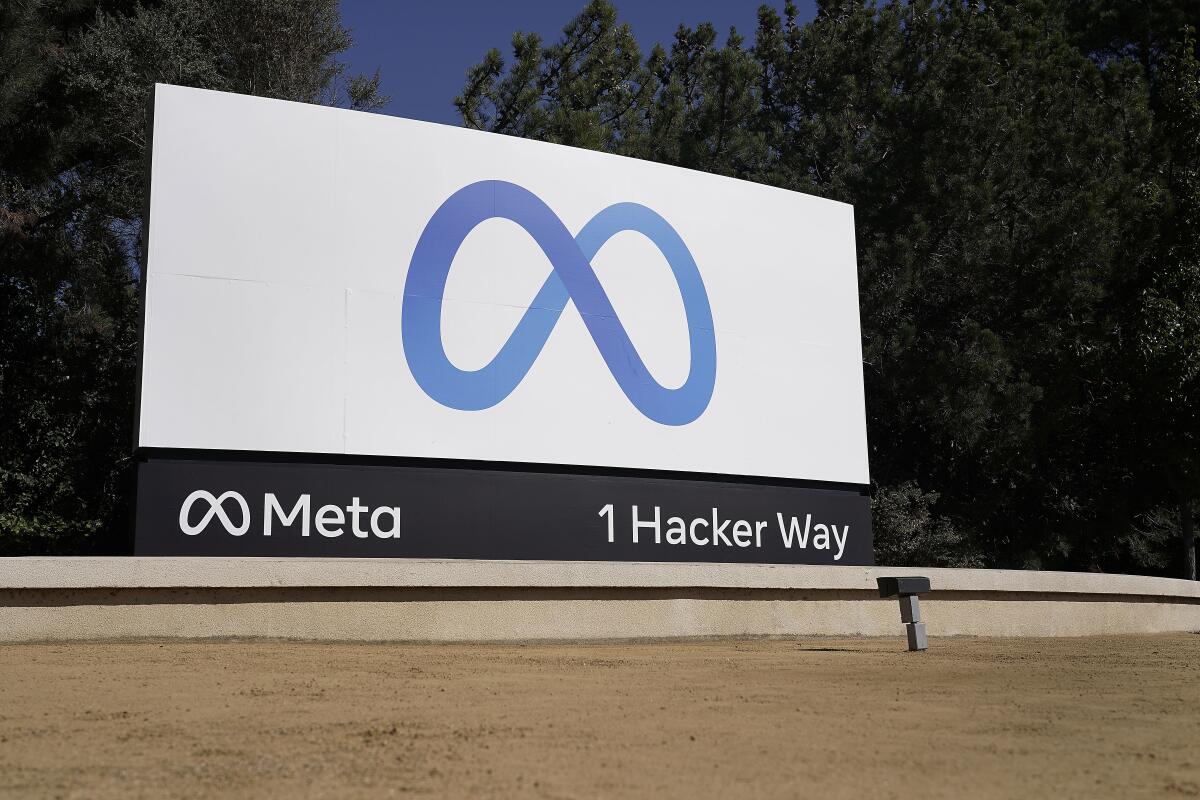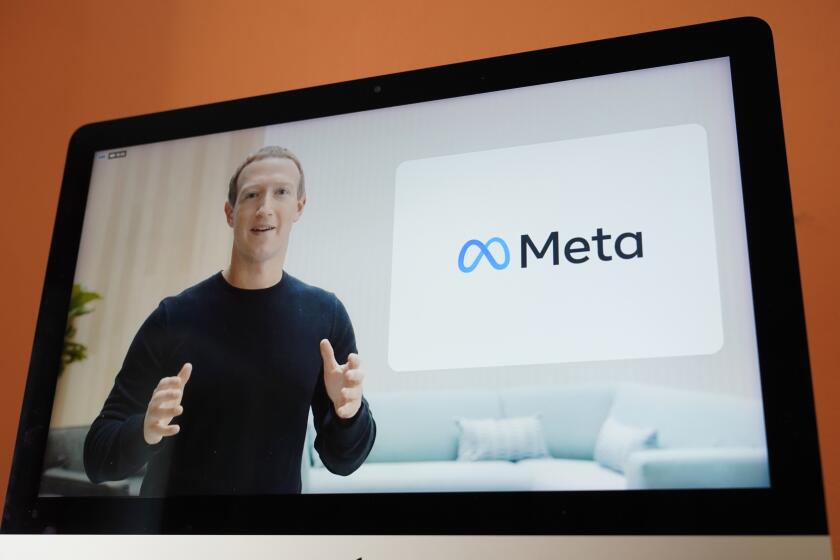Op-Ed: It’s too late to envision a future without Facebook — or at least the world it built

The world’s biggest social media site might be tanking. Earlier this month, Facebook shared that it lost a million daily users for the first time in its history, which led to a loss of nearly $240 billion — a quarter of the company’s value. By Facebook’s own estimation, Apple’s limits on the automatic transfer of iPhone user data to advertisers cost it $10 billion in 2021. Last week Google announced similar protection for Android phones, which is likely to cost Meta, Facebook’s parent company, even more.
On top of the financial woes, Facebook’s user base is aging. Younger people now gravitate to video-sharing platforms like TikTok, and the company appears to be running out of new markets to reach. Zuckerberg’s fix is to pivot to building a metaverse, immersive virtual environments that some predict will have enormous financial and social impact. However, this will take years of research and additional billions of dollars of investment to realize.
Even so, it would take a lot for Meta to shutter. At 2.91 billion monthly users, it is still the largest social network on the planet. At its current value of $565 billion, reduced from its $1-trillion peak last June, Meta is the 11th most valuable company in the world.
Facebook parent Meta Platforms suffered the biggest wipeout in market value for any U.S. company ever, more than $230 billion.
But it is just as unlikely that Facebook can maintain its total dominance over social networking, with prominent competitors such as Tiktok, Twitter, YouTube, LinkedIn and WeChat and hundreds more social media companies clamoring for our attention.
If (or when) these companies overtake Facebook, it will be because of the model Facebook created. The company crystallized our online social environment in ways we take for granted today. It normalized the idea that we can participate in a social network potentially as large as the global population, connecting with our friends’ friends and maintaining relationships with people around the world. It made it common to create groups and movements entirely through online connections. Because of Facebook, we are used to living in a new kind of environment, both public and intimate at once.
Facebook has already profoundly transformed how we understand ourselves in the digital age in a way that cannot be undone. Whether it survives is almost irrelevant — the problems that swirl around it will persist.
The company could collapse tomorrow, and we would still have to resolve fundamental questions social media has raised about how we want to live and prosper together in a digital world.
The most essential issue is managing the enormous power of personal data. Facebook showed just how financially valuable personal data can be when it created a business model that allowed advertisers to micro-target their wares to individuals. Today, Facebook’s mainstream competitors rely on the same principles of targeted advertising. They track user demographics and behavior online to the degree they can by law, and advertisers target subsets of the total user base that are their most likely customers.
While companies like Apple and Google are taking steps to make it more difficult to track user behavior across their devices and applications, these are also business decisions made for competitive reasons that may have a cascade of additional consequences that we might not like.
Even the most dominant corporations have confronted the limits to their life spans. Can Meta outrun its fate?
As every business becomes digital, user behavior any place where we can be tracked — which increasingly includes the physical world — becomes more valuable. The world Facebook built is one where the data produced through our personal behavior is the chief engine of corporate growth.
The power of data has also reshaped our politics. Social media’s influence on elections might conjure the high-profile Cambridge Analytica scandal, in which a British political consulting firm that worked for the Trump campaign improperly used Facebook data to target potential voters. But Facebook and other social media companies have hugely expanded the possibilities for legally using data to influence elections. Digital targeting is now a routine part of the American campaign process across the political spectrum.
And we’re still figuring out how to ensure that online spaces are civil, peaceful and safe — meaning free from hate speech. Frances Haugen, a former product manager on Facebook’s civic misinformation team, revealed how Facebook inflated its effectiveness at removing hate speech, highlighting internal documents showing that more than 95% of the hate speech posted on Facebook stays up. While this shows a clear failure of Facebook’s algorithm- and user-report-driven system for flagging hate speech, it’s not clear how to build a better system.
Policing speech can’t be a job just for the government or online communities themselves. Those responsibilities will have to be distributed among stakeholders, meaning tech companies, regulators and users will have to decide collaboratively where to draw the line between legitimate free expression and hate speech, persuasive versus manipulative uses of language and imagery, and whether political or other high-profile figures should have special limitations or rights online as a result of their influence.
A global wave of intervention could make governments stronger at the expense of basic rights of internet users.
Facebook has also helped launch a contest over power in the emerging techno world of the future. For the last 20 years, about as long as Facebook has existed, it looked as if tech firms would come out on top. America loves business titans. Tech CEOs have played the part well, building winner-takes-all firms that have exponentially increased their wealth, even during the pandemic (though Facebook’s February slump knocked Facebook CEO Mark Zuckerberg out of the top 10 richest people in the world).
But antitrust sentiment is growing. In the U.S., the federal government is pursuing a lawsuit alleging that Facebook engaged in anti-competitive practices to monopolize the social networking market. If they win, Meta could be forced to break into much smaller companies. A couple of European leaders, fed up with Facebook’s reluctance to heed demands over transatlantic data transfers, said this month they’d be just fine if Facebook left their countries.
Other social networks are experimenting to create more privacy and security: Diaspora keeps data in multiple servers throughout the world, which lets users select hosting services in countries they believe have strong personal data protection. Minds is a decentralized blockchain-based network; Vero doesn’t have ads.
Experiments like these will solve some problems and undoubtedly reveal others. But they are all built on the foundation that Facebook laid: a world constantly seeking digital connection at a poorly understood future price.
Amy Zalman is a futurist, the owner of Prescient, a consultancy that helps companies anticipate future trends, and former CEO of the World Future Society. @amyzalman
More to Read
A cure for the common opinion
Get thought-provoking perspectives with our weekly newsletter.
You may occasionally receive promotional content from the Los Angeles Times.












